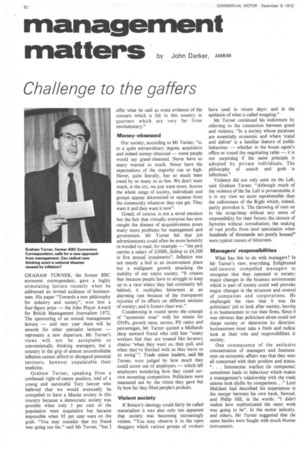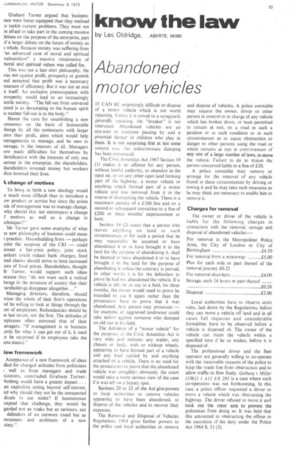management
Page 54

Page 55

If you've noticed an error in this article please click here to report it so we can fix it.
matters by John Darker, MOM
Challenge to the gaffers
GRAHAM TURNER, the former BBC economic correspondent, gave a highly stimulating lecture recently when he addressed an invited audience of businessmen. His paper "Towards a new philosophy for industry and society", won him a four-figure prize — the John Player Award for British Management Journalism 1972. The sponsoring of an annual management lecture — and next year there will be awards for other specialist lectures — represents a new departure. Mr Turner's views will not be acceptable to conventionally thinking managers, but a country in the grip of almost uncontrollable inflation cannot afford to disregard potential saviours, however unpalatable their medicine.
Graham Turner, speaking Horn a confessed right-of-centre position, told of a young and successful Tory lawyer who believed that we would eventually be compelled to have a Maoist society in this country because a democratic society was possible when only 5 per cent of the population were acquisitive but became impossible when 95 per cent were on the grab. "You may consider that my friend was going too far," said Mr Turner, "but I offer what he said as some evidence of the concern which is felt in this country in quarters which are very far from revolutionary."
Money-obsessed Our society, according to Mr Turner, "is, to a quite extraordinary degree, acquisitive and indeed money-obsessed — some people would say greed-obsessed. Never have so many wanted so much. Never have the expectations of the majority run so high. Never, quite literally, has so much been owed by so many to so few. We don't want much, is the cry, we just want more. Across the whole range of society, individuals and groups appear determined to squeeze from the community whatever they can get. They want it and they want it now".
Greed, of course, is not a novel emotion but the fact that virtually everyone has now caught the disease of acquisitiveness poses many mpre problems for management and government. Mr Turner felt that job advertisements could often be more honestly re-worded to read, for example — "the post carries a salary of £3000, falling to £4,500 in five annual instalments". Inflation was not merely a boil in an inconvenient place but a malignant growth attacking the stability of our entire society. "It creates fear because people have to struggle to keep up in a race where they feel constantly left behind; it multiplies bitterness at an alarming rate because of the transparent injustice of its effects on different sections of society; and it fosters class war."
Condemning in round terms the concept of "economic man" with his mania for GNPs, growth rates, norms, PE ratios and percentages, Mr Turner quoted a Midlands shop steward friend who told him "many workers feel they are treated like lavatory chains: 'when they want us, they pull, and when they've finished with us they leave us to swing' ". Trade union leaders, said Mr Turner, were judged by how much they could screw out of employers — which left employers wondering how they could survive mounting competition. Politicians were measured not by the vision they gave but by how far they filled people's pockets.
Violent society If Britain's ideology could fairly be called materialism it was also only too apparent that society was becoming increasingly violent. "You may observe it in the open thuggery which various groups of workers have used in recent days: and in the epidemic of what is called mugging."
Mr Turner continued his indictment by referring to the connection between greed and violence. "In a society whose purposes are essentially economic and where 'stand and deliver' is a familiar feature of public behaviour — whether in the house agent's office or round the negotiating table -it is not surprising if the same principle is adopted by private individuals. The philosophy of snatch and grab is infectious." • Violence did not only exist on the Left, said Graham Turner. "Although much of the violence of the far Left is prosecutable, it is in my view no more reprehensible than the callousness of the Right which, indeed, partly provokes it. The throwing of men on to the scrap-heap without any sense of responsibility for their future; the closure of factories without consultation; the making of vast profits from land speculation when hundreds of thousands are poorly housed" were typical causes of bitterness.
Managers' responsibilities What has this to do with managers? In Mr Turner's view, everything. Enlightened self-interest compelled managers to recognize that they operated in society: major changes in the business environment which is part of society could well provoke major changes in the structure and control of companies and corporations. He challenged the view that it was the politicians' job to look after society, leaving it to businessmen to run their firms. Since ii was obvious that politicians alone could not shape society or determine its direction. businessmen must take a fresh and radical look at their role and responsibilities is society.
One consequence of the exClusive concentration of managers and businessmen on economic affairs was that they were all concerned with their position and status. if . . Internecine warfare (in companies'', sometimes leads to behaviour which makes a management's relationship with the trade unions look idyllic by comparison..." Lord Melchett had described his experiences in the merger between his own bank, Samuel. and Philip Hill, in the words: "I didn't realize how sophisticated the razor work was going to be". In the motor industry, and others, Mr Turner suggested that the same battles were fought with much bluntet instruments.
Graham Turner argued that businessmen were better equipped than they realized :o tackle current problems. They must not 3e afraid to take part in the coming massive lebate on the purpose of the enterprise, part 3f a larger debate on the future of society as a whole. Because society was suffering from 'an advanced case of moral and spiritual malnutrition" a massive renaissance of moral and spiritual values was called for.
This was not a hair-shirt philosophy. He was not against profit, prosperity or growth md accepted that profit was a necessary neasure of efficiency. But it was not an end n itself. An exclusive preoccupation with rosperity would lead to an increasingly iterile society. "The fall-out-from universal ;reed is as devastating to the human spirit Ls nuclear fall-out is to the body."
Hence the case for establishing a new :onsensus on the basis of honourable :hange by all the contestants with larger iims than profit, aims which would help nanagements to manage, and be seen to nanage, in the interests of all. Managers ;ow made difficulties for themselves by lentification with the interests of only one lartner in the enterprise, the shareholders. ihareholders invested money but workers den invested their lives.
k change of motives To bring to birth a new ideology would c much more difficult than to introduce a ew product or service but since the prime ask of management was to manage change, why should that not encompass a change f motives as well as a change in !chniques?"
Mr Turner gave some examples of what le new philosophy of business could mean 1 practice, Housebuilding firms — perhaps nder the auspices of the CBI — could ioneer a fair-price policy; joint stock ankers could reduce bank charges; food tail chains should strive to limit increased osts of food prices. Shareholders, thought fr Turner, would support such ideas ecause they "do not want such a radical hange in the structure of society that their nareholdings disappear altogether..."
Managing directors, therefore, should view the whole of their firm's operations nd be willing to look at things through the fes of employees. Redundancies should be Le last resort, not the first. The attitudes of nployees often mirrored that of their Lanagers. "If management is in business irely for what it can get out of it, it need x be surprised if its employees take the Lme stance."
law framework Acceptance of a new framework of ideas died for changed attitudes from politicians ; well as from managers and trade nionists. concluded Graham Turner. slothing would have a greater impact . . . an capitalists acting beyond self-interest. nd why should they not be the unexpected dicals in our midst? If businessmen :cepted that challenge, they would be garded not as soaks but as saviours, not defenders of an outworn creed but as rerunners and architects of a new ciety.",








































































































